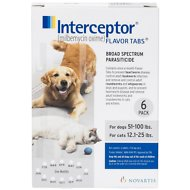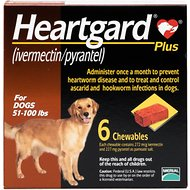Interceptor vs Heartgard Plus For Dogs: Our 2024 Comparison
Quick Guide
- Key Differences Between Interceptor And Heartgard Plus
- Key Features Of Interceptor
- Key Features Of Heartgard Plus
- Our Overall Comparison of Interceptor vs Heartgard
- What Is Better for Dogs, Interceptor Or Heartgard Plus?
- What’s Cheaper, Interceptor Or Heartgard Plus?
- What’s Easier To Find, Interceptor Or Heartgard Plus?
- For Heartworm Treatment, Which One Is Better, Interceptor Or Heartgard Plus?
- For Intestinal Parasites, Which One Is Better, Interceptor Or Heartgard Plus?
- Which Is Easier To Give To My Dog, Interceptor Or Heartgard Plus?
- Overall Winner Between Interceptor And Heartgard Plus
- The Most Common FAQs About Interceptor And Heartgard Plus – Answered!
- Conclusion
Heartworms and intestinal parasites are a serious issue in dogs, and they can affect any dog at any time. Mosquitoes that carry these parasites are present in all 50 states, and they can infect your dog in just a single bite.
Heartworms will infect your dog’s heart and move into its blood vessels and lungs – causing major respiratory and cardiovascular issues, and congestive heart failure if left untreated. Your dog may not even show any symptoms until it’s too late.
Intestinal parasites like whipworms and roundworms are also severe and can interfere with proper nutrition, and cause issues like diarrhea and digestive problems, so they should be eliminated.
But there are a lot of different deworming and worm prevention medicines out there for dogs. How can you know which ones are right for your dog, and how can you choose and make sure that you protect your pup?
We’re here with an overview of two of the most commonly-used anti-worm medicines for dogs – Interceptor vs Heartgard plus. If you’re wondering which one may be a better option for your pup, you’re in the right place. Let’s take a look at each one of these medicines now, and help you understand which one is right for your dog.
Key Differences Between Interceptor And Heartgard Plus
Both Interceptor and Heartgard Plus are intended to fight against worms, including heartworms and intestinal parasites. However, they are not identical and have some key differences that you should be aware of when shopping for an anti-worm medication. Below, we’ve identified a few of the significant differences between these different types of anti-worm medicines. Take a look now.
- Active ingredients – While both Interceptor and Heartgard Plus are intended to be antiparasitic medicines, they use different active ingredients. Heartgard Plus uses a combination of ivermectin and pyrantel, two powerful anti-parasitic medications that have been used for years.
In contrast, Interceptor uses only a single active ingredient, milbemycin oxime, which provides broad-spectrum protection against almost all common digestive parasites, as well as heartworms.
These ingredients do the same basic thing, but they protect against different parasites, and ivermectin and pyrantel, used in Heartgard Plus, may react poorly with some other pet medications. We will discuss that more in-depth in the section “What Is Better for Dogs, Interceptor vs Heartgard Plus?” - Type of parasite protection – Heartgard Plus protects against heartworms, hookworms, and roundworms. Interceptor provides more parasite protection, as it can also destroy whipworms. Interceptor Plus, another variant of the Interceptor product, also kills tapeworms.
Both Heartgard Plus and Interceptor can destroy adult digestive worms and can kill heartworms in the larval stage. Neither product can kill adult heartworms, so it is recommended that your dog be tested for heartworm infection by a veterinarian before you begin using either medicine. - Age of the first dosage – Interceptor can be puppies which are as young as 4 weeks old, so it is a good choice if you need to protect your dog from a very young age. Heartgard Plus, on the other hand, has been tested for use on dogs as young as 6 weeks, and should not be used on younger dogs.
- Usability for both dogs and cats – Heartgard Plus is formulated specially for dogs, and is not meant to be used in cats, even in the correct dosage. In contrast, Interceptor can be used to treat both dogs and cats.
- Flavoring – Heartgard Plus uses a formulation that incorporates real beef, making it delicious and attractive to most dogs. Interceptor uses a blend of artificial beef flavoring made from pork and soy protein. Picky dogs may benefit from the more natural flavor of Heartgard Plus, but both products are relatively easy to administer.
While both medications are quite similar, you should be aware of the differences between each product while you’re considering which one may be right for your dog. Now that we’ve discussed the primary differences between each of these medications, let’s move on and look at each one individually.
Key Features Of Interceptor
Interceptor is one of the most commonly-prescribed antiparasitic medications, and its primary ingredient, milbemycin oxime, has been in use for nearly 3 decades. Here is a more in-depth breakdown of some of the key features of Interceptor.
- Controls 4 types of parasites – Interceptor can control heartworms by destroying them in the larval stage before they hatch and become adults. After the larvae are killed, the heartworms will pass through your dog’s body naturally, and be eliminated over time.
It also can control 3 types of major intestinal parasites, which are hookworms, roundworms, and whipworms. The Interceptor Plus formulation, which we’ve previously reviewed in the past, can even destroy tapeworms, providing even more protection. Unlike heartworms, Interceptor can kill intestinal parasites also after they are fully grown. After treatment, the parasites will die and be passed through your dog’s intestinal tract, eliminating the infestation. - Beef flavored chew – Interceptor uses a chew that is beef flavored and made using soy and pork protein. It has an acceptability rate of 94% among dogs, so most dogs are happy to eat it. It’s important to note that it is supposed to be chewed thoroughly by your dog to release the proper dosage. If your dog tends to swallow treats in a single bit, you may want to consider crushing the chew and feeding it to your dog, piece by piece.
- Monthly dose – You only need to provide a single dose of Interceptor every month to provide your dog with comprehensive protection against heartworms and intestinal parasites. You must provide your dog with Interceptor for 6 months to be 100% protected against heartworms.
- Can be used on dogs as young as 4 weeks – Compared to all other anti-parasite products on the market, Interceptor is the best for early treatment of puppies. Dogs who are over 4 weeks old and over 2 lbs can be provided with Interceptor, ensuring that they receive the proper antiparasitic treatments from a very young age. If you want to treat your puppy as early as possible, Interceptor is a great choice.
- Usable for cats in the proper dosage – Interceptor is formulated to be safe for both cats and dogs. The only difference is the dosage, which differs for animals of every weight. As long as you choose the proper dosage, Interceptor is safe to use on both dogs and cats.
Hopefully, this list has helped you understand some of the most significant advantages and unique properties of Interceptor. Next, let’s take a look at Heartgard Plus.
Key Features Of Heartgard Plus
Heartgard Plus is quite similar to Interceptor in several ways, but it also has its unique properties that you should understand before purchasing it or asking your veterinarian for a prescription.
- Controls 3 types of parasites – Heartgard Plus destroys heartworm larvae, preventing them from hatching. Like Interceptor, it does not kill adult heartworms. If your dog has adult heartworms, it will need specialized treatment from a veterinarian to eliminate them, so it’s always recommended that you test your dog for heartworms before using Heartgard Plus.
Beyond heartworms, Heartgard Plus can destroy roundworms and hookworms. It is not effective against whipworms, though. - Made with real beef – Heartgard Plus is one of the most delicious antiparasitic medications, thanks to its delicious formulation which is made with real beef. Your dog must chew the tablet to break it down and ensure it spreads throughout the body properly.
- Monthly dose – Because you only have to administer Heartgard Plus once per month, it’s easy to make sure that your dog is completely protected from heartworms, roundworms and hookworms. Make sure to create a reminder to give your dog its medication every month, as it must be regularly administered to guarantee its efficacy.
- Can be used on dogs as young as 6 weeks – Heartgard Plus can be given to dogs as young as 6 weeks of age. Puppies need to be protected against parasites as soon as possible, even if they are not yet going outside or going on walks. This is especially true if you have other dogs in your home. Mosquitoes and other methods of parasitic can spread eggs and larvae very quickly between animals, putting your puppy at risk.
- Safe for pregnant, lactating dogs – This is an excellent feature of Heartgard Plus. Some antiparasitic medications should not be used on pregnant or lactating dogs.
With its delicious formula, easy monthly dosage and strong antiparasitic properties, Heartgard plus is an excellent option for dogs of all ages and can help protect against both deadly heartworms and intestinal parasites which can harm your dog’s quality of life.
Our Overall Comparison of Interceptor vs Heartgard
What Is Better for Dogs, Interceptor Or Heartgard Plus?
Both medicines are relatively safe for dogs, and side effects are relatively rare. For Interceptor, a few observed side effects of use include:
- Vomiting and diarrhea
- Lethargy/depression
- Loss of appetite
- Muscle Weakness
- Excessive salivation
- Ataxia
- Convulsions
Heartgard Plus has a similar list of side effects, which includes:
- Lethargy/depression
- Anorexia
- Diarrhea and vomiting
- Pupil dilation
- Staggering
- Drooling
- Convulsions
Both medicines are safe for use on breeding, lactating dogs and have been confirmed to have no additional side effects on pregnant, female dogs. Either one is fine if your dog may breed soon, so that will help give you some peace of mind.
As mentioned above, Heartgard Plus can be used on dogs 6 weeks of age and older, while Interceptor can be used safely at 4 weeks, making Interceptor a bit better for younger dogs.
- Australian Shepherd/Mini Australian Shepherd
- Collie and Border Collie
- English Shepherd
Additionally, ivermectin also has adverse reactions with the flea prevention medication Comfortis (spinosad). A reaction between these two medications can cause a condition called “ivermectin toxicity,” which can result in serious adverse side effects. This is especially common in MDR1-sensitive dogs like collies and shepherds.
Because of this, we recommend that you consult with your vet about Heartgard Plus usage if you have any of the above breeds or a similar dog breed.
What’s Cheaper, Interceptor Or Heartgard Plus?
If the price is your biggest concern, Heartgard Plus is the clear winner. It’s much cheaper than Interceptor, and can often be found for less than half of the price. If you choose a generic pyrantel/ivermectin medicine, you can save even more.
Interceptor is quite a bit more expensive, so it may not be the best choice if you are on a tight budget. Despite this, though, it may not be the best idea to get Heartgard Plus, even though it’s cheaper.
This is because, as we touched on above, Heartgard Plus eliminates heartworms, hookworms and roundworms, but does not kill whipworms. If you opt for Interceptor Plus, you can even get protection from tapeworms.
In our opinion, the peace of mind of getting more protection from parasites is worth the extra price for Interceptor. To find out what may be right for your pet, discuss your pet’s needs with your veterinarian.
What’s Easier To Find, Interceptor Or Heartgard Plus?
There is no clear winner here. Both Heartgard Plus and Interceptor are ubiquitous, and you can get them at most vet’s offices, pet pharmacies, pet stores, and even some large chains like Wal-Mart and Target, as well as online from websites like Chewy.com. If you want to get Interceptor or Heartgard Plus, you’ll have absolutely no trouble finding it.
We typically recommend shopping online at a website like Chewy.com for pet medicine. You can get your medication auto-delivered and prices tend to be lower online than in pet pharmacies, which allows you to save more on your pet’s medication.
For Heartworm Treatment, Which One Is Better, Interceptor Or Heartgard Plus?
Both Interceptor and Heartgard Plus are equally effective at destroying heartworm larvae, so this category is a tie. It’s important to note, however, that consistent dosages are required for both products in order to guarantee the safety of your dog.
Neither Interceptor or Heartgard Plus will destroy adult heartworms, either. All commonly-prescribed heartworm medicines are intended as prophylactics, which can destroy larvae and eggs before they hatch, preventing heartworm infection. If your dog has adult heartworms, it will need to undergo a specialized treatment regimen at a vet’s office.
For Intestinal Parasites, Which One Is Better, Interceptor Or Heartgard Plus?
Interceptor wins this category, hands-down. While Heartgard Plus only prevents heartworms and kills hookworms and roundworms, Interceptor is also able to kill whipworms, and Interceptor Plus can even kill tapeworms if you opt for this medicine rather than the basic Interceptor formulation.
If you use Heartgard Plus, your dog will have plenty of protection from heartworms, but may still be vulnerable to some intestinal parasites. That’s why we would recommend Interceptor over Heartgard Plus if this is a significant concern for you.
Which Is Easier To Give To My Dog, Interceptor Or Heartgard Plus?
Because it is made with real beef rather than artificial flavors, Heartgard Plus wins this category. However, both Heartgard Plus and Interceptor are quite easy to give to your dog. They are both meat-flavored, chewable tablets that are readily accepted by almost any breed.
For proper absorption, your dog must chew the tablet thoroughly. If it does not, the medicine may not be completely effective. If you are having trouble giving one of these medicines to your dog, or your dog tends to swallow treats whole, we would recommend not giving the treat to your dog in one piece. You can break it up and mix it with one of your dog’s favorite foods, like peanut butter or a meat-based gravy.
We do not recommend mixing the tablet in with your dog’s food. It may not eat the whole thing, which means it will not receive the dosage it needs to ensure its safety from heartworms and intestinal parasites. If you need more ideas or recommendations about how to get your dog to take its medicine, we recommend that you ask your veterinarian for more information.
Overall Winner Between Interceptor And Heartgard Plus
Our overall top pick is Interceptor. Heartgard Plus is very effective against heartworms, and it may have a more appealing flavor and be much cheaper, but it simply does not provide as much protection from intestinal parasites.
In contrast, Interceptor is more effective against intestinal parasites and destroys a larger variety of worms. You can even kill tapeworms if you choose to upgrade to the Interceptor Plus formula. Sure, you’ll pay a bit more than you would if you bought Heartgard Plus, but the peace of mind that you get from better protection means that it’s worth every penny.
If you are still not sure which medicine is right for your dog, we recommend that you consult with your vet. They will be able to explain the differences between each medication in more detail and ensure that your pet is protected from the most common parasitic threats.
The Most Common FAQs About Interceptor And Heartgard Plus – Answered!
Choosing the right medicine for your dog is a complicated and involved process, and you want to make sure that you are as informed as possible when doing so.
That’s why we’ve put together this list of a few of the most frequently asked questions about Interceptor, Heartgard Plus, and antiparasitic medication for dogs. Take a look now, and get answers!
- How are heartworms, roundworms, and other parasites transmitted? – Most commonly, heartworms and intestinal parasites like roundworms are transmitted by mosquitoes. Mosquitoes can harbor the eggs or larvae of these parasites, and when they feed on your dog, they can be released into your bloodstream. Then, the larvae will hatch, causing a parasitic infestation in your dog. This is how heartworms are transmitted.
Intestinal parasites can be transmitted in a few other ways, though. Ingestion of fecal matter or contact with fecal matter that contains larvae is also a standard method of transmission in dogs. Contaminated soil, water, and food can all cause the transfer of these parasites. Ingestion of fleas can also cause tapeworm in dogs. - Can I skip treatment with Interceptor or Heartgard Plus in the winter? – We do not recommend ever skipping treatment with either of these medications. Even though mosquitoes will die in cold climates, there is always a risk that your dog could pick up a heartworm or intestinal worm infestation.
Also, regular treatment is required for 100% protection with some medicines. Interceptor, for example, has been proven to be 100% effective against heartworms only after it has been given to your dog for 6 months. In the long run, treating your dog consistently, even during the winter, will ensure its safety and good health. - What if I forget to give my dog Interceptor or Heartgard Plus? – If you remember to treat your dog within a month, give it the proper dosage of Heartgard Plus or Interceptor, as recommended. Never give your dog a double dose of medication. This could result in serious side effects.
If you have failed to give your dog its medicine after two months or more, discontinue its treatment and consult with your vet to get their recommendation about how you should continue. They may recommend that you restart your dog’s medication, or they may ask you to switch to a new drug, depending on your situation. - Can dogs transmit heartworms to one another? No. A mosquito bite can only transmit heartworms. If a mosquito bites an infected dog and then bites your dog, it could transmit heartworm larvae – this is the way that the infection is passed between dogs. However, direct contact with a dog who has heartworms cannot transmit heartworms. It is only spread through mosquito bites.
- Will Interceptor or Heartgard Plus Prevent tick and flea infestations? – No. Neither of these drugs will provide any protection against ticks or fleas. Make sure to consult with your vet, in order to choose an appropriate anti-flea and anti-tick medication for use with Interceptor or Heartgard Plus.
- Will feeding puppies be protected if the mother uses Interceptor or Heartgard Plus? No. Both Interceptor and Heartgard Plus are safe for use in breeding and lactating females, but the medicine will not be transmitted to puppies in any significant level through the mother’s milk. This will not protect puppies.
To protect puppies from heartworms and intestinal parasites, you must provide them with the proper dose of medicine. You can start using Interceptor at 4 weeks of age, and use Heartgard Plus beginning at 6 weeks of age. Make sure to administer the medication every month to protect your pups. - What are the symptoms of intestinal parasites and worms? – If you think that your dog may need Heartgard Plus or Interceptor to destroy intestinal parasites, but you don’t know what symptoms to look for, we’re here to help.
The most common symptoms of intestinal parasites include vomiting and diarrhea, as well as “scooting.” Some dogs may also exhibit weight loss and a distended abdomen. Puppies affected by intestinal parasites may fail to gain weight properly. We recommend having your dog checked for parasites by a vet at least once per year.
We hope that these FAQs have been helpful, and answered some of your questions as you consider your options and choose between Interceptor and Heartgard Plus for your dog. If you have other questions or are still not sure what’s right for your pup, we recommend scheduling a vet appointment.
Conclusion
We recommend Interceptor for most dogs. It’s a bit more expensive, but it’s safer, more effective, and can be used in puppies as young as 4 weeks. However, Heartgard Plus is just as good at destroying heartworms, and also protects against some common intestinal worms.
Both of these medicines will require a prescription, of course. So whether you already know which one you would prefer – or you still need more information – we recommend scheduling an appointment with your vet right away. You’ll learn more about each medicine, and you can find out what’s right for your dog, based on its breed, past health issues, activities and other such factors. Thanks for reading and happy shopping!














